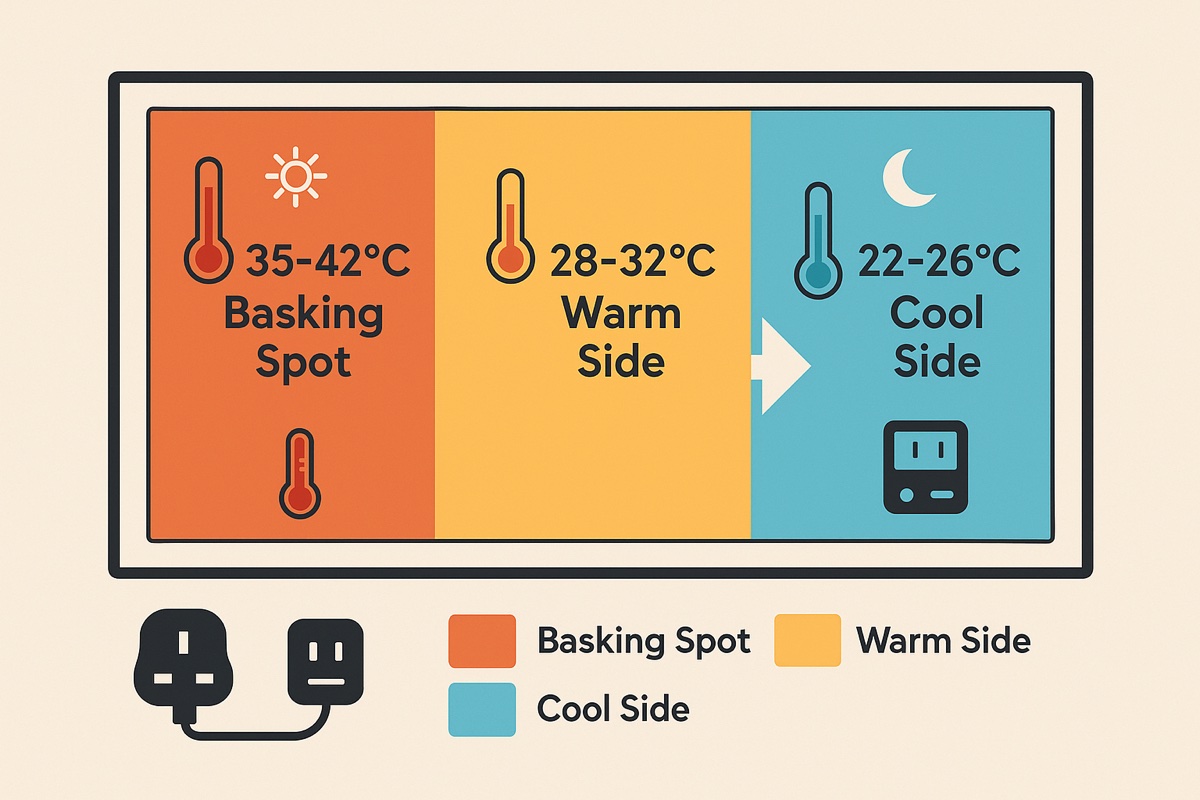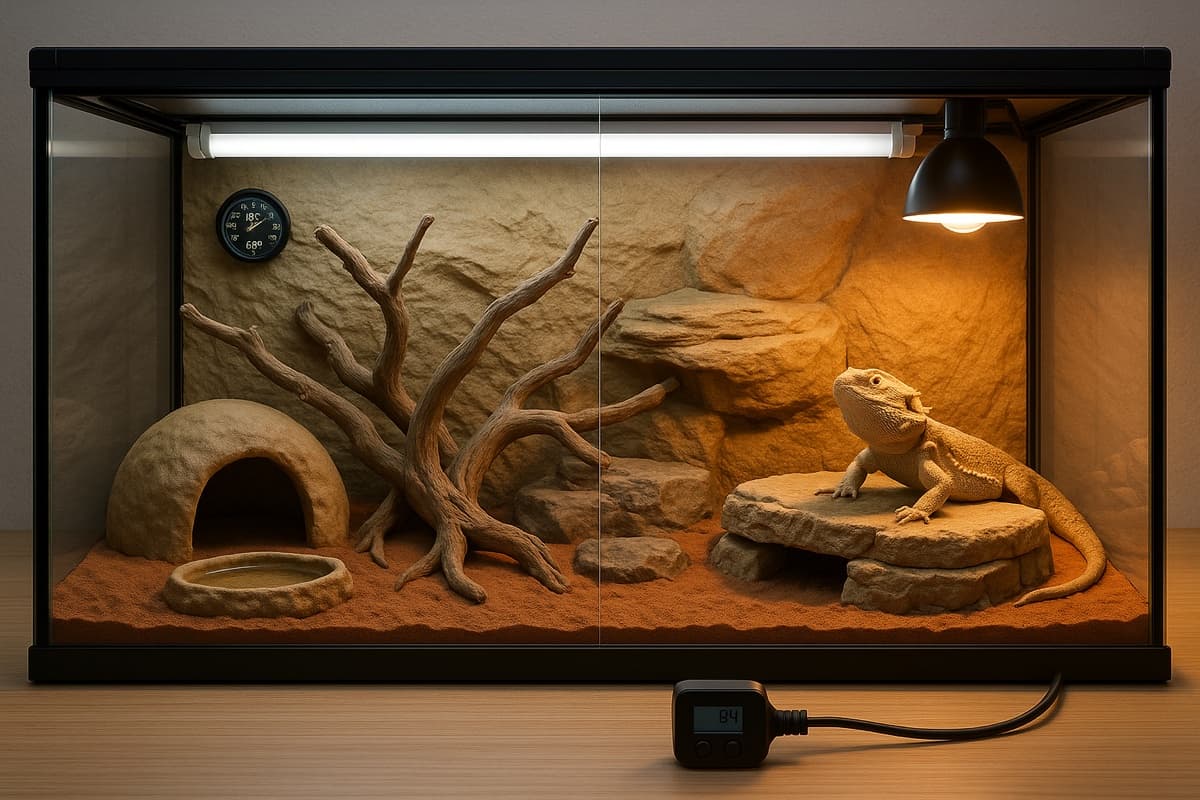Need expert help now? Find an RCVS-verified exotic vet near you.
Setting up your first reptile terrarium can seem daunting, but with the right guidance, you'll create a thriving habitat for your scaly companion. This comprehensive guide covers everything UK exotic pet owners need to know.
If you're specifically setting up for a bearded dragon, check our bearded dragon health guide first.
Quick Answer
Setup cost: £190-£410 (120cm glass enclosure, heating + thermostat, UVB tube, substrate, hides). Monthly running cost: £15-£35 (electricity 24.5p/kWh). Essential: basking lamp, UVB lighting (10-12%), digital thermostat (CRITICAL for safety), temperature gradient 22-42°C. Setup 48 hours before adding reptile.
📋 Table of Contents
Complete Setup Cost (UK 2025)
Initial Investment
-
Enclosure: £80-£200 (120cm glass terrarium)
-
Heating: £40-£80 (basking lamp + thermostat + ceramic emitter)
-
UVB Lighting: £25-£45 (T5 tube + fixture)
-
Substrate & Décor: £30-£60 (hides, branches, substrate)
-
Thermometers: £15-£25 (digital hygrometer/thermometer combo)
-
Total: £190-£410
Monthly Running Costs
-
Electricity: £15-£35/month (based on 24.5p/kWh Ofgem Oct 2024)
-
Food: £10-£30/month (livefood + vegetables)
-
Supplements: £5-£10/month (calcium, multivitamin)
📊 Total first-year cost: £450-£850 (including setup + 12 months running)
Choosing the Right Enclosure
For most beginner reptiles like bearded dragons or leopard geckos, a glass terrarium is ideal:
-
Bearded Dragons: Minimum 120cm x 60cm x 60cm (4ft x 2ft x 2ft)
-
Leopard Geckos: Minimum 90cm x 45cm x 45cm (3ft x 1.5ft x 1.5ft)
-
Corn Snakes: Minimum 90cm x 45cm x 60cm (3ft x 1.5ft x 2ft)
Always buy the largest enclosure you can afford and accommodate - your reptile will appreciate the extra space.
Temperature Control (UK Climate Considerations)
UK homes typically range from 18-22°C, which is too cold for most reptiles. You'll need:
Heating Equipment
-
Basking Lamp: Creates a warm spot (28-42°C depending on species)
-
Ceramic Heat Emitter: For nighttime heating without light
-
Heat Mat: Under-tank heating for ground-dwelling species
-
Thermostat: ESSENTIAL - prevents overheating and burns
Temperature Zones
Create a thermal gradient:
-
Basking spot: 35-42°C (bearded dragons), 30-32°C (leopard geckos)
-
Warm side: 28-32°C
-
Cool side: 22-26°C
-
Night temperature: 18-24°C
 Temperature gradient zones in a UK reptile terrarium setup
Temperature gradient zones in a UK reptile terrarium setup
UK Tip: Winter months require extra heating. Keep your reptile room above 18°C.
💡 Learn more about UK reptile heating costs in winter.
UVB Lighting — Critical for Reptile Health
Most diurnal (day-active) reptiles MUST have UVB lighting to synthesize vitamin D3 and absorb calcium:
-
UVB Tube: 10-12% for desert species, 5-6% for forest species
-
Replace every 6-12 months: UVB output decreases even if the bulb still lights
-
Distance matters: Follow manufacturer guidelines (usually 30-45cm from basking spot)
-
12-hour cycle: Use a timer for consistency
Leopard geckos are crepuscular and can survive without UVB if supplemented properly, but many keepers now provide low-level UVB (5%) for optimal health.
Substrate Selection
Choose substrate based on your species:
Safe Options
-
Reptile carpet: Easy to clean, no impaction risk
-
Tile: Retains heat well, hygienic
-
Paper towels: Cheap, perfect for juveniles
-
Excavator clay: For species that burrow (bearded dragons, leopard geckos)
Avoid for Young Reptiles
-
Loose substrates (sand, wood chips): Impaction risk if ingested
-
Cedar or pine: Toxic fumes
UK-specific: Avoid substrates that retain moisture in poorly ventilated UK homes - can lead to respiratory infections.
Humidity Control
UK humidity averages 70-80%, which is:
-
Too high for desert species (bearded dragons, leopard geckos): Use ventilation, avoid water bowls in warm areas
-
Perfect for tropical species (chameleons, some snakes)
Tools
-
Digital hygrometer: Monitor humidity accurately
-
Misting system or spray bottle: For tropical species
-
Humid hide: For leopard geckos during shedding
Furnishings and Enrichment
Essential Items
-
Hides: At least 2 (one on warm side, one on cool side)
-
Basking platform: Rocks, branches, or commercial platforms
-
Water dish: Changed daily
-
Climbing branches: For arboreal species
Enrichment Ideas
-
Rotate decorations monthly
-
Add safe plants (live or artificial)
-
Create multiple basking levels
-
Provide varied textures
Essential Equipment (UK Links)
Shop these items on Amazon UK for best availability and prices:
Heating & Temperature
-
🛒 Habistat Pulse Thermostat (Essential - NEVER skip this!)
-
🛒 Exo Terra Basking Spot Lamp (50W-100W depending on species)
-
🛒 Ceramic Heat Emitter (Nighttime heating without light)
-
🛒 Digital Thermometer/Hygrometer Combo (Monitor accurately)
UVB Lighting
-
🛒 Arcadia T5 12% UVB Tube (Gold standard for desert species)
-
🛒 Zoo Med ReptiSun 10.0 UVB (Alternative option)
-
🛒 T5 Light Controller Unit (Fixture for UVB tube)
-
🛒 Plug Timer (12-hour light cycle automation)
Substrate & Décor
-
🛒 Reptile Carpet (Easy to clean, safe for all species)
-
🛒 Slate Tiles (Retains heat, hygienic)
-
🛒 Reptile Hides (Get 2 minimum - warm & cool side)
-
🛒 Ceramic Water Dish (Heavy, won't tip over)
Complete Kits (Beginner Option)
-
🛒 Exo Terra Bearded Dragon Kit (120cm complete setup)
-
🛒 VivExotic Leopard Gecko Kit (90cm starter kit)
💡 Pro tip: Always buy a thermostat separately even if it's not in the kit. This is NON-NEGOTIABLE for safety.
Maintenance Schedule
Daily
-
Check temperatures (use temp gun)
-
Refill water
-
Spot clean waste
-
Observe reptile behavior
Weekly
-
Full clean of substrate (if using loose)
-
Disinfect water dish
-
Check equipment function
Monthly
-
Deep clean entire enclosure
-
Inspect for wear and damage
-
Rotate décor for enrichment
Common UK-Specific Issues
Electrical Safety
-
Use RCD-protected sockets
-
Never overload outlets
-
Inspect cables regularly for chewing damage
Cold Drafts
-
Keep terrarium away from windows
-
Avoid placing near external walls
-
Use background insulation in winter
Finding Equipment
UK stockists: Northampton Reptile Centre, Swell Reptiles, The Reptile Room
When to Consult a Vet
Find an RCVS-registered exotic vet BEFORE you need one. Search our UK exotic vet directory →
Look for these warning signs:
-
Lethargy or appetite loss
-
Abnormal breathing
-
Incomplete shedding (stuck shed)
-
Swelling or lumps
-
Diarrhea or abnormal feces
📞 In an emergency, see our 24/7 emergency vet finder.
Legal Requirements (UK)
Most common reptiles (bearded dragons, leopard geckos, corn snakes) do not require a DWA license. However:
-
Venomous species: Require Dangerous Wild Animals license from your local council
-
CITES species: Some rare reptiles require Article 10 certificates
-
Animal Welfare Act 2006: You're legally responsible for meeting your reptile's needs
Learn more about UK exotic pet laws
Final Checklist
Before bringing your reptile home:
-
✅ Terrarium running for 48 hours with stable temperatures
-
✅ All equipment tested and thermostats calibrated
-
✅ Substrate laid and hides positioned
-
✅ Food source arranged (livefood delivery or local supplier)
-
✅ Exotic vet contact saved
-
✅ Thermometers and hygrometers installed
Frequently Asked Questions
What size terrarium do I need for a bearded dragon UK?
Minimum 120cm x 60cm x 60cm (4ft x 2ft x 2ft) for an adult bearded dragon. Larger is better - they're active lizards that need space to thermoregulate between basking and cool zones.
How much does it cost to heat a reptile terrarium UK?
£15-£35 per month based on 24.5p/kWh (Ofgem Oct 2024 price cap). Bearded dragons cost more (£27-£35/month) than leopard geckos (£9-£11/month) due to higher temperatures required.
Do all reptiles need UVB lighting?
Most diurnal (day-active) reptiles like bearded dragons require UVB lighting to synthesize vitamin D3 and absorb calcium. Nocturnal species like leopard geckos can survive without it but benefit from low-level UVB (5%).
What is the best substrate for a leopard gecko UK?
Reptile carpet, tile, or paper towels are safest for leopard geckos. Avoid loose substrates like sand for juveniles due to impaction risk. Excavator clay works for adults if you want a naturalistic setup.
How often should I clean my reptile terrarium?
Daily: spot clean waste and refill water. Weekly: disinfect water dish and clean substrate if using loose. Monthly: deep clean entire enclosure with reptile-safe disinfectant.
Do I need a DWA license for a bearded dragon UK?
No. Common reptiles (bearded dragons, leopard geckos, corn snakes) do NOT require a Dangerous Wild Animals license in the UK. Only venomous species and large constrictors need DWA licenses.
Need Help?
Every reptile species has unique needs. Visit our Species Care Guides for detailed information on your specific pet.
Have questions? Our community of UK exotic pet owners is here to help!
Frequently Asked Questions
What size terrarium do I need for a bearded dragon UK?
How much does it cost to heat a reptile terrarium UK?
Do all reptiles need UVB lighting?
What is the best substrate for a leopard gecko UK?
How often should I clean my reptile terrarium?
Do I need a DWA license for a bearded dragon UK?
Need a specialist exotic vet?
Find RCVS-Verified Exotic Vets Near YouFind Exotic Vets & Resources

Want more expert tips like this?
Download your free Exotic Pet Starter Guide and make sure your setup is right from day one.
Related Guides
Written by: BritExotics Editorial Team
Updated October 18, 2025
